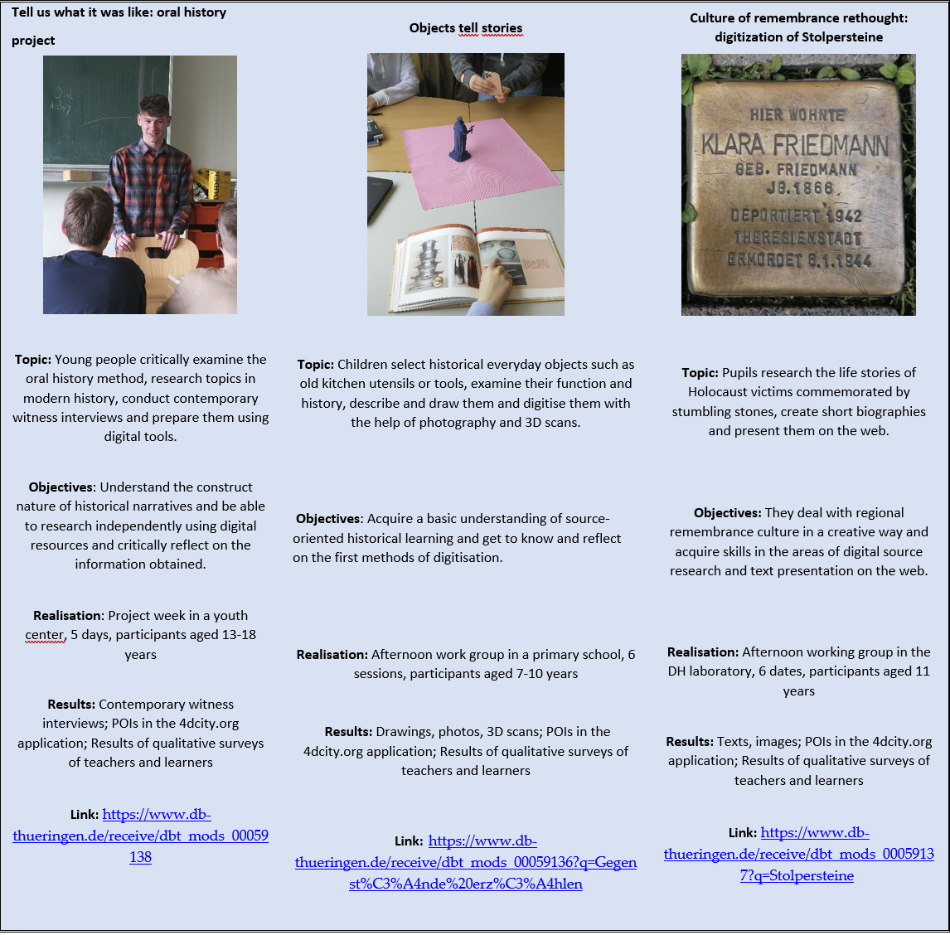1.
Introduction
Digital literacy and technologies are becoming increasingly important not only in university teaching but also in life-long learning [1,2]. Currently, most teaching activities in digital humanities aim at university students [3]. Since student research labs have so far been located mostly in the STEM field, out-of-school educational opportunities dealing with the humanities have so far mainly taken place in the context of museums and libraries. The aim of this contribution is to (a) examine the current state of educational programmes in the field of digital humanities and cultural heritage, (b) present the current state of teaching labs in the field of digital history, and (c) present initial results of engaging pupils in digital humanities projects.
2.
Core curricula and competency frameworks
2.1.
Competency Frameworks
Competency Frameworks provide agreed definitions, descriptions, and implementation methods according to the demands, standards, and guidelines of specific sectors [4]. The european Digital Competence Framework [5] takes into account digital literacy as a future and critical skill for citizens. Frameworks that include recommendations for educators are f.i. the Digital Literacy Global Framework [6] which is aimed at higher education educators in the English-speaking world and covers media literacy, communication and collaboration, study skills and information literacy, among others.
2.2.
Educational programs in Digital Humanities
Syllabi and core topics in Digital Humanities are mostly analysed on university level
[7].
These approaches also mention the importance of teaching content, methods, and skills in combination with practical formats like case-studies, projects, evaluation or project-based-learning.
3.
The Digital Laboratory approach in school education on humanities
Since the previously mentioned frameworks primarily target university students and postgradual education, school education is currently mainly targeted by heritage institutions, although the European Heritage Strategy for the 21st century
[8]
mentions the demand to incorporate heritage education in school curricula.
A current state of student laboratories in digital humanities was studied via a keyword-based survey in 10/2022 via Google Scholar.
1
The filter-based investigation was limited to articles in German and publication dates 2012-2022. The search revealed initially 200 articles, of which 15 dealt with history laboratories and history and has been further investigated. An evaluation took place in MaxQDA via qualitative content analysis based on Mayring. As preliminary results, a majority of school laboratories in Germany have so far been established primarily in the STEM
sector. Although some labs focus on social sciences and humanities, the connection between history and computer science has hardly existed so far.
4.
The Jena Digital History Lab
To test and establish digital labs in the humanities, the Digital History Lab (DH Lab), funded by the Stiftung für Innovation in der Hochschullehre, started at the University of Jena in 2022. In the DH Lab, students develop digital teaching offers on cultural-historical topics and test and reflect on them with pupils. In doing so, they gain practical experience in the digital research, preparation and communication of cultural history content, which they can build on in their later professional lives. The thematic focus of the first project year was on Jena's city history and was intended to motivate the children and young people to deal with the cultural heritage, personalities and historical events of their home city in a source-based and creative way. For this purpose, various digital methods such as digital source research and text analysis, the creation of 3D scans and contemporary witness interviews were learned and used. The first results of the project are three courses designed by art history and history teaching students, which were offered to children and young people as part of school and extracurricular study groups and a project week in a youth center and are now made available to other teachers on a public platform (Fig. 1). In a subsequent survey of the students, the necessary technical equipment such as internet-capable devices and digital sound recording devices, the different prerequisites of the learners in terms of prior knowledge, digital skills and working speed, as well as legal questions regarding the publication of work results were identified as challenges.
Fig 1: Example of courses created (Images: Sophie-Luisa Hopf, Marlene Kropp)
